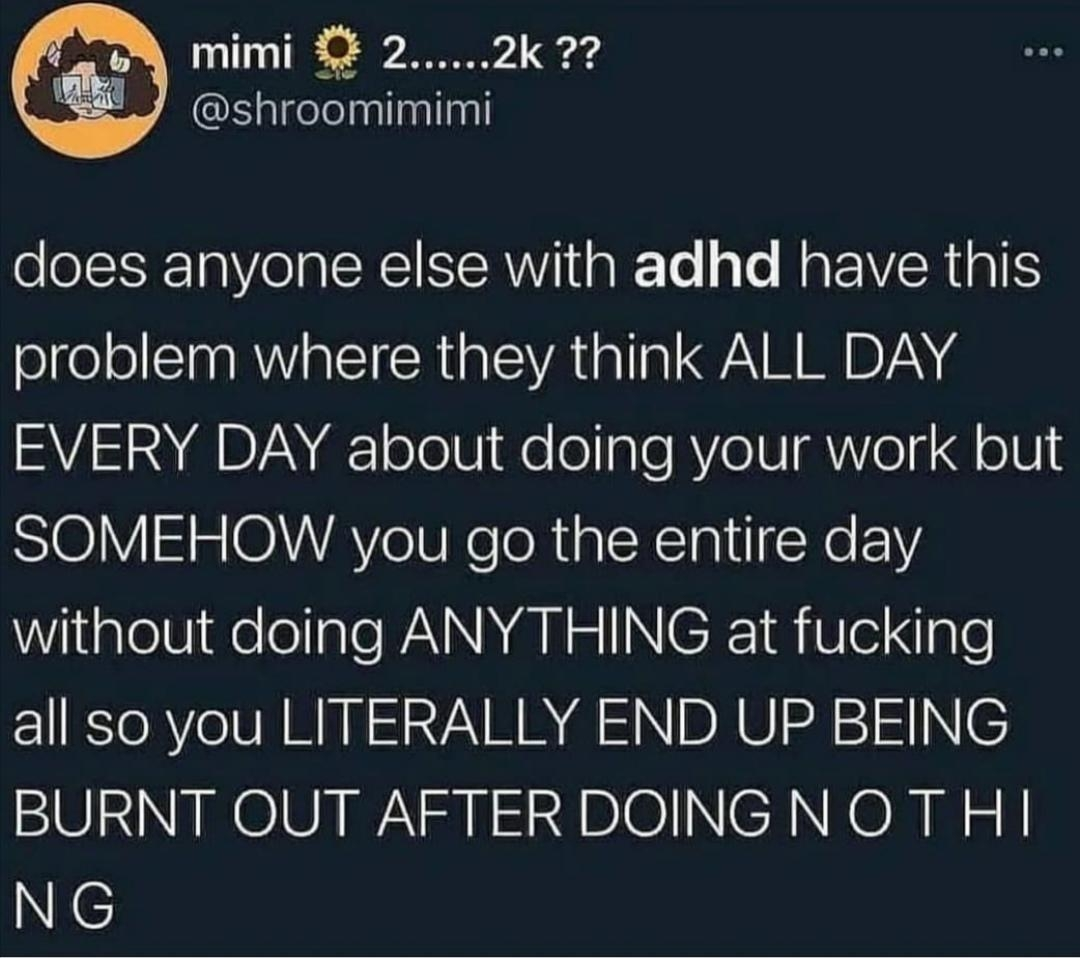this post was submitted on 13 Nov 2023
1028 points (98.1% liked)
ADHD memes
8019 readers
25 users here now
ADHD Memes
The lighter side of ADHD
Rules
Other ND communities
- ADHD - Generic discussion
- Ausome Memes
- Autism
- AuDHD
- Neurodivergence
founded 1 year ago
MODERATORS
you are viewing a single comment's thread
view the rest of the comments
view the rest of the comments

I used to chroncially be like this, it was awful. Somehow, somewhere, without outside help I flipped, and now Im organized, efficient and proactive. Marking this spot so I can think about it and come back when I think I know what changed.
You have to tell us, you know that right? I am waiting for this moment for 4 decades.
I'm in more or less the opposite scenario. I used to be able to actually do shit, then something snapped and it's far more difficult for me to do anything efficiently. I think what snapped was effectively my self confidence. After a period of existential crisis, things stopped feeling so important all of a sudden. So the herculean effort that allowed me to complete all my work and keep up on everything stopped being possible, because it briefly became impossible leading me to recognize how unsustainable that was.
Now I'm in a position where I still try to get what I need to done, but I try not to stress about it so much and I prefer to do what I want. And making myself do what I need to do is partially a matter of medication (Vyvanse) and partially trying to find reasons to enjoy/prefer the tasks that are important for my survival, then capitalizing on that intrigue/excitement.
Basically, I guess it comes down to choosing to accept whatever our current reality is and trying to work from there. There are reasons that I'm fortunate, just as there are reasons others would probably say I'm falling behind in life. Doesn't really matter in the end. All any of us can do is what we can actually do. If we don't allow that to be enough, we'll drive ourselves insane with the dissonance.
I dont really know. Maybe my post is a good example of it though. I dont know how to complete the task, but I started it anyway. Just did a little bit. Then, having broken the seal, its not seem so hard.
Thats how i approach stuff i have to do. Put it on the list and start it at the same time, under the self-agreement that ill just do a little bit of it then stop.
Rather than 'clean whole house' i start with 'just pick up clothes off bedroom floor'
This removes the mental fear of 'uhhh its going to take forever!'. Once ive done a bit, it becomes clear thar I can just do the whole thing, or at least recognize that its not very hard after all.
I listened to a podcast a few years ago that was really transformative in my way of thinking. (I can't remember the exact podcast but I linked one that talks about procrastination); and below is a transcribed excerpt from the episode:
Fabrice explained “want” traps. For example, you may sit at your computer cruising the internet or playing digital games, all the while telling yourself “I really want to get to work on my paper,” or taxes, or whatever. But in point of fact, you DON’T want to get to work on the thing you’re putting off. You WANT to be doing exactly what you are doing.
We “trick ourselves into thinking we want something (like doing our taxes) when we really want to be doing something else (watching TV, playing computer games.) So, once again, we are telling ourselves stories that don’t map onto reality.”
Our real “wants” are the result of an unconscious cost-benefit analysis we make in our head, where the choice that comes out on top is our real want. It’s only when I really start doing my taxes that I’ll know this is what I want to be doing (probably because the urgency of the matter made the cost-benefit analysis tip in that direction).
David was trying to see if this concept of “wants” can be helpful in therapy but had trouble seeing how this might help someone who’s procrastinating.
Fabrice explained it like this: First, we need to realize that we are doing what we want in the moment; so, it’s a choice. Next, we can make our cost-benefit analysis conscious and see that we’re only considering short-term factors (e.g., it’s a lot more comfortable right now to be watching TV than doing taxes). Finally, we can develop some empathy for our future self (the one who will be pulling an all-nighter three weeks from now, or who will have to pay late fees) to reevaluate our cost-benefit analysis with more complete data.
Fabrice also explained that procrastination can sometimes be difficult to treat because it’s an addiction.
Yeah i think so. Same happened with my roadrage. I used to screech at people forever on the road, then it just got too hard so now im just chill.
Likewise with drinking alcohol, one day I just had had enough of being sick all the time, so I just decided to stop.
I believe that a 'mental rock bottom' is an apropriate way to describe it.
I hope my brain does that sometime soon.